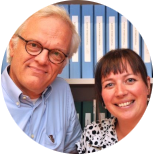[tickets]

[tickets]

Anne is Professor in Pediatric ENT Surgery at UMC Utrecht and University College London. She has lead various multidisciplinary clinical trials and has written systematic reviews in the field of prevention and treatment of pediatric upper respiratory tract infections. She has also been Coordinating Editor of the ENT Disorders Group since 2012, a function she shares with Mr Martin Burton, Director of the UK Cochrane Centre.
“I worked in Belgium and England at the beginning of my career where I noticed that the policy regarding paediatric respiratory tract infections differed greatly from that in The Netherlands. In Belgium and England treatment is mainly with antibiotics. In The Netherlands surgical intervention is the treatment of choice: insertion of grommets or removal of the tonsils. I wondered as to the reason for this difference. Was there evidence supporting this treatment of these infections? This lead me to clinical trials, wherein our first question is always: “What has the Cochrane Collection published about this?” If there was no systematic review in the area of a certain intervention, we wrote it ourselves. That is how my collaboration with the Cochrane Collection started and developed.”
What sort of expertise can the Dutch Cochrane Centre (DCC) provide researchers?
“One can get support from the DCC throughout the entire review process. For example, you can ask the editorial base if a title that you want to register is a priority for the DCC. For your protocol you might want advice to see if you are on the right track with your primary endpoint or how you can best write an analysis plan. They can also help with carrying out a meta-analysis or with formulation of results. I set up a new research group in England with a number of young researchers who are writing their first systematic review. They have all participated in the workshops offered by Cochrane and have learned a great deal.”
What would you like to say to a researcher who wants to write a review?
“Enjoy it but don’t underestimate it. Don’t think that you will be able to write a systematic review during a three month research internship. It really is a long-term commitment. However, you are not alone; there is an entire institute willing and able to assist you.”

Peter is a specialist-nephrologist at the UMC Utrecht and principal investigator for Sympathy, a national renal denervation study, in which 14 hospitals participate. Among his many collaborators on this study is Rosa de Jager, MD, PhD student, who also works in the Nephrology Department of the UMC Utrecht.
In The Netherlands 30% of women and 34% of men have high blood pressure. It is expected that renal denervation, a new form of treatment, can significantly lower the blood pressure of patients with a systolic (upper) measurement of at least 160 mmHg. Renal denervation literally means: 'the interruption of the nerve pathways to and from the kidneys.' These nerves play an important role in the development of high blood pressure.
Peter: “The Sympathy study aims to gain more insight into the value of this new treatment for high blood pressure, as well as, to determine the safety and effectiveness of this technique in the long-term. The primary endpoint has been set at 6 months and we aspire to a follow-up period of at least 2 years. Naturally, we will continue to follow the patients for a longer period thereafter.”
Which expertise have you called upon for this study?
“Peter: “From various fields. Epidemiology was involved in the design of the study, the request for subsidy, the methodology and in the design of the protocol. Epidemiology has also been closely involved throughout the duration of the project and continuously assesses if the methodology is correct or not.”
Rosa: “It is extremely important for this multicenter trial that multiple people or groups can work simultaneously with the same database. This is possible using the online application, Research Online, which is provided by the Data Management Department of the Julius Center. The entry and processing of huge amounts of data have to occur in the same, controlled manner and according to clear regulations all of which are provided by Data Management.”
Peter: “The HTA (Health Technology Assessment) Department provides assistance with cost effectiveness analyses. These sorts of analyses are becoming increasingly important to the government especially with new treatments. Furthermore, we have employed Julius Clinical to do the monitoring. This has to do with the fact that regulations have become stricter making monitoring more necessary.”
Rosa: “The Biostatistics Department has assisted us with how we can best incorporate the various analyses, such as sample size calculation, into the protocol. This is important for later, once we have all the data, in order to carry out meaningful analyses. In the area of Project Support, we have a good project manager who plays an important role in communication between the various parties, including the participating hospitals. All questions and/or problems are dealt with by the project manager who passes them on to the appropriate people.”
What would you like to say to the researcher who is reading this?
Peter: “In the last 20 years the quality requirements for research methodology have been enormously tightened. In order to satisfy them you need specialists. It is fantastic that the UMC Utrecht has a support desk for researchers, so make use of it!”